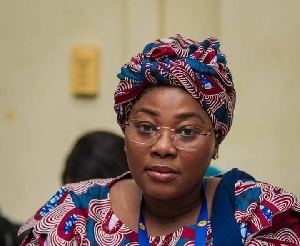- General News
- Crime & Punishment
- Politics
- Regional
- Editorial
- Health
- Ghanaians Abroad
- Tabloid
- Africa News
- Religion
Politics of Tuesday, 29 April 2025
Source: www.ghanawebbers.com
Free Sanitary Pads project may result in bitter disappointment if – Savelugu MP cautions
Hajia Fatahiya Abdul Aziz, the MP for Savelugu, has raised concerns about the Free Sanitary Pads initiative. This program was launched by President John Dramani Mahama to help keep girls in school. She believes the intention is good but warns of potential disappointments.
Abdul Aziz stated that good intentions need careful execution. Without proper planning, this initiative could symbolize mismanagement and broken promises. She expressed her worries in an article on the subject.
The MP suggested a targeted approach for implementation. She recommended starting with the five northern regions of Ghana, which are impoverished. Additionally, she called for improved sanitation facilities in schools nationwide.
While acknowledging the policy shift towards menstrual equity, she noted serious issues with planning and sustainability. As a woman and lawmaker, she feels anxious rather than proud about this initiative.
The government has allocated GH¢292.4 million for two million girls, averaging GH¢146 per student annually. However, quality sanitary pads cost between GH¢15 and GH¢40 monthly. This creates a concerning funding gap.
Abdul Aziz questioned if this is a genuine intervention or just a political gimmick. She also highlighted geographic inequity; girls in northern regions remain underserved despite high poverty levels.
Infrastructure challenges further complicate the initiative's success. A 2024 report by SEND Ghana found that 63% of basic schools lack adequate toilet facilities. Without proper water and sanitation infrastructure, distributing pads may do more harm than good.
She raised concerns about delayed deliveries and product quality issues as well as corruption risks in procurement processes. The current model may promote dependency instead of long-term resilience.
Abdul Aziz urged the government to focus on local production of sanitary products. Reviving the cotton industry and establishing manufacturing hubs in Tumu and Tamale were among her suggestions. She also recommended tax exemptions on sanitary products for vulnerable girls.
Improving school infrastructure is crucial too, including gender-friendly toilets by 2026 to support this initiative effectively. Other recommendations included dedicating 1% of VAT revenue to menstrual health initiatives.
Using blockchain technology could enhance transparency in procurement processes as well as publishing real-time performance reports to build public trust was also suggested by her.
The Savelugu MP appealed to President Mahama for a detailed implementation plan with pilot phases before national rollout. She emphasized involving civil society and local leaders as active collaborators in this process.
Finally, she encouraged Ghanaians to demand accountability and support local manufacturing while addressing menstruation stigma head-on. “This initiative is bold,” she concluded, “but hope alone is not enough.” Girls deserve dignity beyond just receiving pads; they need protection and action too.











